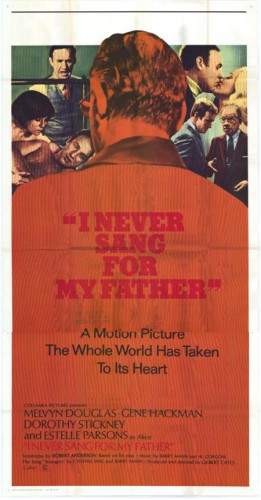
Episode 179: Ere the Winter Storms
 I wonder as I wander: How come people are changed so little by the roadblocks of life? Sure, they make short-term adaptations, and “take emergency measures” in order to survive. But lasting change? Change of heart, change of character?
I wonder as I wander: How come people are changed so little by the roadblocks of life? Sure, they make short-term adaptations, and “take emergency measures” in order to survive. But lasting change? Change of heart, change of character?
A telling example of this comes in the Broadway play and later movie entitled “I Never Sang for My Father”. Robert Anderson wrote the play, and also the screenplay for the 1970 Hollywood version, which turned out to be extremely good — the word is “shattering”. “I Never Sang for my Father” concerns the relationship of a 40-year-old man with his 80-year-old father. The father is impossible: self-involved to the max, cantankerous, outspoken in a negative way, and basically a “user” of everyone around him, especially his wife and son. The man is also charming, funny, and successful.
The nerve of the play is “My Father’s” melt-down and collapse after his wife of 55 years suddenly dies. Turns out the poor man’s mourning is not just about his wife, but involves the very deepest core pain, and childhood losses, of his life. Yet withal, with the ripped-up human mourning of loss that surfaces through the death of the one closest to him, there is no growth, no transforming sympathy, no acquired humility.
The question the play poses for me is the question of human intractability. Haven’t you known someone like this? There is all the reason in the world for him or her to have learned from their mistakes, or gained from their losses. But nothing seems to have registered. (I think the cause of their resistance is that the person’s pain is too great, as in “If I go there, I shall certainly die.”)
The way to rebound from a loss is to go through the loss. That’s the last thing I want to hear.
This podcast is dedicated to John R. Nolon.
Episode 180: Metropolitan Life
This is an urban memory, you might say, that burst to life recently in my life — like “A Big Green Pearl” (Orpheus). I decided to talk about it for its own sake, and without interpretation. That is because almost every time I’ve tried to make a point, or get someone to change their mind, it hasn’t worked. Or almost every time.
I read an interview last week, from people I admire, on the subject of marriage. So different was their “take” on what marriage involves, yet so listened-to is that take, that I said to myself: What in the world have you been doing all these years, PZ? (It’s as if you never existed — all those hours of pre-marital counseling, your 40-years’ queue of talks and sermons on romance and ABBA-type impasse. Quelle waste!)
So just say what you have to say — about what happened this week, for example, about your “Sunday in the Park with George”. Tell the story and leave it to God to spark the listener. That’s how Kerouac worked. I think it’s how my current fave Robert W. Anderson worked. Say it your way and let Heav’n dispose the rest.
Anyway, it all begins and ends a stone’s throw from Cleopatra’s Needle, by the Metropolitan Museum, in Central Park. Magic for the beginning, and also for the end, of life.
https://www.youtube.com/watch?v=6DaKGnkZ9WI

COMMENTS












